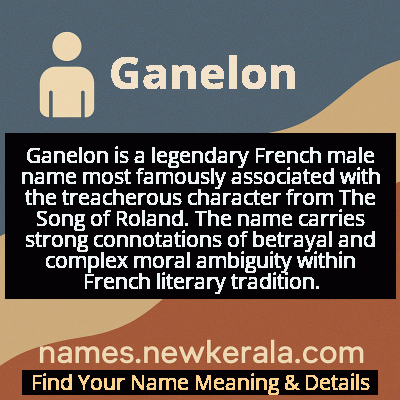Ganelon Name Meaning & Details
Origin, Popularity, Numerology Analysis & Name Meaning of Ganelon
Discover the origin, meaning, and cultural significance of the name GANELON. Delve into its historical roots and explore the lasting impact it has had on communities and traditions.
Name
Ganelon
Gender
Male
Origin
French
Lucky Number
5
Meaning of the Name - Ganelon
Ganelon is a legendary French male name most famously associated with the treacherous character from The Song of Roland. The name carries strong connotations of betrayal and complex moral ambiguity within French literary tradition.
Ganelon - Complete Numerology Analysis
Your Numerology Number
Based on Pythagorean Numerology System
Ruling Planet
Mercury
Positive Nature
Adventurous, dynamic, curious, and social.
Negative Traits
Restless, impatient, inconsistent, prone to indulgence.
Lucky Colours
Green, white.
Lucky Days
Wednesday.
Lucky Stones
Emerald.
Harmony Numbers
1, 3, 9.
Best Suited Professions
Sales, marketing, travel, entertainment.
What People Like About You
Versatility, charisma, adventurous spirit.
Famous People Named Ganelon
Ganelon
Literary Character
Infamous traitor in The Song of Roland who betrayed Charlemagne's rear guard
Ganelon de Saint-Amand
Historical Knight
Minor French noble mentioned in crusader chronicles, possibly inspired the literary character
Ganelon de Montfort
Religious Figure
Cistercian abbot known for his theological writings and monastic reforms
Name Variations & International Equivalents
Click on blue names to explore their detailed meanings. Gray names with will be available soon.
Cultural & Historical Significance
The name has been used for centuries as a literary archetype for treachery, appearing in various adaptations and references across European literature. In French culture specifically, 'Ganelon' evokes strong negative connotations, much like 'Judas' in Christian tradition, serving as a cautionary figure about the consequences of envy, revenge, and disloyalty within feudal society. The character's complexity - he betrays not out of pure evil but from personal grievance and wounded pride - has made him a subject of ongoing literary analysis and psychological study.
Extended Personality Analysis
Individuals named Ganelon are often perceived as complex, ambitious, and potentially manipulative characters, reflecting the literary archetype's legacy. They may possess sharp intelligence and strategic thinking abilities, but these qualities can be shadowed by tendencies toward resentment, envy, and calculated self-interest. The name carries an inherent duality - suggesting someone who might appear loyal and trustworthy on the surface while harboring deeper, potentially treacherous motivations.
This doesn't mean modern bearers of the name embody these traits, but the literary association creates a psychological profile of someone who might struggle with feelings of being undervalued or who possesses a talent for political maneuvering that could be used for either constructive or destructive purposes depending on their moral compass. The name suggests a person of considerable capability whose greatest challenge might be balancing personal ambition with ethical considerations and loyalty to others.
Modern Usage & Popularity
In contemporary times, Ganelon remains an extremely rare given name, primarily used in literary or historical contexts rather than for newborn children. The name's strong association with treachery makes it unpopular for modern naming, though it occasionally appears in French-speaking regions as a surname or in artistic circles where parents might choose it for its dramatic, literary quality. Some fantasy literature and role-playing games have adopted the name for villain characters, continuing its tradition as a marker of complex antagonists. In France, the name is virtually nonexistent in birth records, appearing more frequently in academic discussions of medieval literature or as a metaphorical reference to betrayal in political commentary.
Symbolic & Spiritual Meanings
Symbolically, Ganelon represents the archetype of the trusted insider who betrays, embodying themes of envy, revenge, and the corruption of feudal loyalty. The name has become a metaphor for any situation where someone uses their position of trust to undermine the very system they're meant to protect. In broader symbolic terms, Ganelon signifies the danger of personal grievances overriding collective responsibility, the tension between individual ambition and group loyalty, and the psychological complexity of characters who commit evil acts not from pure malice but from wounded pride and calculated self-interest.

